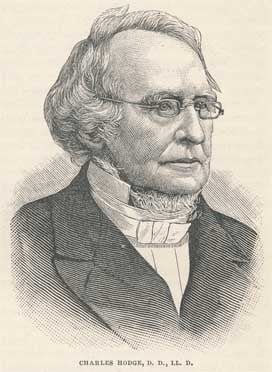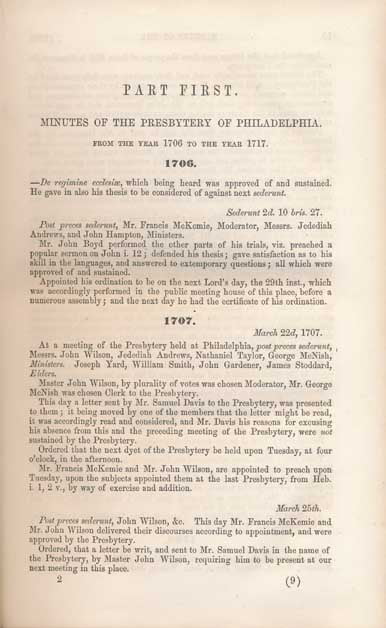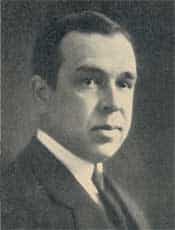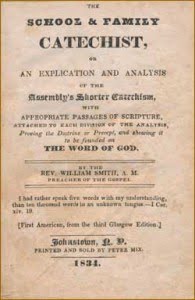A Stirring Confession of Faith
On Sunday evening,
March 17, 1935, Dr. J. Gresham Machen filled the pulpit of the First Presbyterian Church of Pittsburgh, Pennsylvania. This time period was in the framework of being under indictment for refusing to cease and desist from the support of the Independent Board for Presbyterian Foreign Mission, as the Mandate from the General Assembly of the Presbyterian Church USA, had stated in 1934. His ordination was thus at stake. His standing in that denomination was at stake. Listen to his profession of faith given on that evening.
“My profession of faith is simply that I know nothing of the Christ proclaimed, through the Auburn Affirmation. I know nothing of a Christ who is presented to us in a human book containing errors, but know only a Christ presented in a divine book, the Bible which is true from beginning to end. I know nothing of a Christ who possibly was and possibly was not born of a virgin, but know only a Christ who was truly conceived by the Holy Ghost and born of the Virgin Mary. I know nothing of a Christ who possibly did and possibly did not work miracles, but know only a Christ who said to the winds and the waves, with the sovereign voice of the Maker and Ruler of all nature, ‘Peace be still.’ I know nothing of a Christ who possible did and possibly did not come out of the tomb on the first Easter morning, but know only a Christ who triumphed over sin and the grave and is living now in His glorified body until He shall come again and I shall see Him with my very eyes. I know nothing of a Christ who possibly did and possibly did not die as my substitute on the cross, but know only a Christ who took upon Himself the just punishment of my sins and died there in my stead to make it right with the holy God.”
Despite what the ecclesiastical machinery of the Presbyterian Church would do, Dr. Machen’s conviction was settled. He ended it all by stating that he would “rather be condemned for an honest adherence to the Bible and to my solemn ordination pledge than enjoy the highest ecclesiastical honors and emoluments as the reward of dishonesty.”
Words to Live By: Can you echo the words of J. Gresham Machen today? Today the attacks continue upon both the written and living Word. Let us affirm this confession today—for the Word of God is true, though all men stand in error—until God takes us home.
For further study:
To read the full message delivered by Dr. J. Gresham Machen that Sunday evening, March 17, 1935,
click here.
News coverage of the above event:
PASTOR SCORES MODERNISM AS CAUSE OF TRIAL.
Dr. J. Gresham Machen Defends Beliefs in Sermon At Church Here.
HEARING TOMORROW.
Philadelphia Minister Will Face Presbyterian Court at Trenton.
Dr. J. Gresham Machen of Philadelphia, president of the Independent Board of [sic] Presbyterian Foreign Missions, who goes on trial before a special court of the church tomorrow at Trenton, N.J., declared last night: “The Presbyterian Church is in the midst of a conflict between two irreconcilable adversaries–Christianity and Modernism.”
Speaking at the First Presbyterian Church here, Dr. Machen defended his fundamentalist beliefs and accused the Presbyterian Church of spreading “anti-Christian” propaganda.
“I cannot support this anti-Christian propaganda now being furthered by the official board of Foreign Missions of the Presbyterian Church in the United States,” he said. “I cannot place the shifting votes of general assemblies or any other human councils in place of an authority which rightly belongs only to the Word of God.
Refused to Quit Board
The General Assembly of the Presbyterian Church last year outlawed the Independent Board of Missions and ordered all ministers to resign from it within 90 days. Dr. Machen refused and was ordered to stand trial before the New Brunswick presbytery. Two hearings have been held and the third and final one is scheduled tomorrow.
Dr. Machen last night laid his troubles to “modernists” and asserted: “Christianity is taught in the Bible and the Constitution of the Church; but modernism has grown to dominate the ecclesiastical machine.”
Attacks Auburn Affirmation
Citing the Auburn Affirmation, which he said sets forth the modernist argument and is signed by 1923 ministers, Dr. Machen declared:
“The Auburn Affirmation directly attacks the doctrines of the full truthfulness of the Bible and declares that some of its basic teachings are merely theories among other possible theories and are non-essential.
“It is typical of the conditions in the church that Dr. Cordie J. Culp of New Brunswick, the presiding officer of the commission now trying me in Trenton, is a signer of the modernist document,” he said. “It is also typical that John E. Kuizenga of Princeton Seminary took the lead in the unanimous vote of the commission that all efforts of my counsel to refer to the modernist doument be barred.”
Professor at Seminary
Dr. Machen further declared he is prepared to prove that the board’s orders for him to resign are “contrary to the constitution of the church.”
“I have also offered to prove,” he said, “the Board of Foreign Missions is unfaithful to its great trust. The commission has refused to listen to my evidence or to the arguments of my counsel. Of course, I will be condemned, but I should far rather be condemned for an honest adherence to the Bible and to my solemn ordination pledge than enjoy even the highest ecclesiastical honors and emoulments [sic] as the rewards of dishonesty.”
Dr. Machen, who spoke in the absence of Dr. C. E. Macartney, is a profess of New Testament in Westminster Theological Seminary, Philadelphia.
[excerpted from
The Pittsburgh Press, 18 March 1935, page 11.]
[Note: The correction name of the organization is the Independent Board for Presbyterian Foreign Missions. Too often in news coverage and elsewhere, the name was shown in error, substituting “of” in place of “for”]




